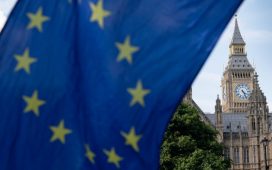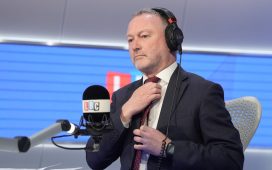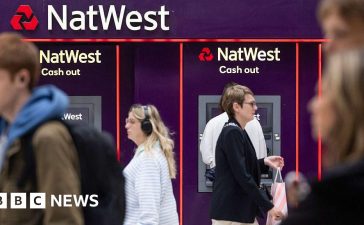Investors raise bets on September interest rate cut
Newsflash: City investors are raising their bets that the Bank of England could cut interest rates in September.
The money markets now indicate that there’s a 45% chance that Bank Rate is cut to 4.75% next month, from its current level of 5%, and a 55% chance that borrowing costs are unchanged.
That follows this morning’s data showing that inflation rose by less than expected in July, to 2.2% – below City forecasts of 2.3%.
Before this morning’s data, a September rate cut was only a 36% probability, according to City pricing.
Traders also now expect two rate cuts by the end of this year – previously, only one cut was fully ‘priced in’, with a second seen as likely.
As flagged at 7.11am, the BoE will be reassured that service sector inflation slowed last month, to 5.2%:
Capital Economics explains:
Importantly for the Bank of England, the decline in services inflation from 5.7% to 5.2% was much bigger than anyone anticipated. That was well below the 5.6% rate forecast by the Bank in August, although closer to our own forecast of 5.4%.
However, Aaron Hussein, global market strategist at J.P. Morgan Asset Management , suggests the Bank is unlikely to cut in September:
‘Today’s inflation print will reassure members of the committee that voted for a rate cut last month that they may finally be taming the inflation beast. While headline inflation ticked up as favourable base effects fade, services inflation – a crucial measure of domestically generated inflationary pressure – moderated. This coupled with moderating wage growth, suggests that inflation may finally be heading in the right direction.’
‘However, with economic growth on a cyclical upswing since the start of the and the labour market remaining resilient, their remains a risk that cutting too quickly will fan the inflation flames. We therefore think it’s unlikely that the Bank will follow up its August cut with a cut in September. Absent any material shock to growth, this cutting cycle is likely to be gradual with a quarterly cadence most likely.
Investors banking on imminent rate cuts will therefore be disappointed.’
Key events

Sarah Butler
Mars, the chocolate to pet food group, has struck a $30bn (£23.4bn) deal to buy Kellanova, the maker of Pringles and Pop-Tarts.
The all-cash offer is be the biggest ever acquisition for the privately owned Mars, dwarfing its $23bn takeover of the chewing gum maker Wrigley in 2008.
The deal could attract scrutiny from competition watchdogs as it would bring together well-known consumer goods brands including Mars’ Twix, Bounty and Milky Way with Kellanova’s Pringles, Special K cereal and Carr’s water biscuits.
However, experts have said that the limited overlap between the two companies’ products means the deal is likely to be given the green light.
The euro has hit a seven-month high against the US dollar today, as traders anticipate a soft US inflation report in under 30 minutes.
The single currency has hit $1.1023, its highest level since the start of January.
YouGov: British consumer confidence rebounds in July
Just in: consumer confidence in Britain improved last month, as people grew more optimistic about their household finances.
Polling company YouGov’s index of consumer confidence has jumped by almost two points this month, from 109.4 to 111.3.
Briton’s net confidence in their household finances for the year ahead rose into positive territory for the first time since August 2021. Confidence among homeowners that house prices will rise in the next 12 months rose too.
That’s an encouraging signal for economic growth this year, as it could lead to increased consumer spending.
Professor Costas Milas, of the University of Liverpool Management School, tells us why the Bank of England could cut rates again in September:
The BoE has repeatedly mentioned services inflation to justify why MPC members did not cut interest rates earlier. I plot below ‘price surprises in services inflation’ (proxied by the four-quarter difference in services inflation).
Historically, services inflation moves much faster on the way down than on the way up. This plot is telling me that, everything else equal, there is a good reason for MPC members to cut interest rates in September!
The “encouraging drop” in services inflation in July may increase the probability of further rate cuts from the Bank of England in September, argues the NIESR economic research institute.
They say:
The significant fall in services inflation to 5.2% will have surprised the Bank of England who expected it to remain around 5.7%.
This, alongside the fall in core inflation to 3.3%, is a strong sign that underlying inflation dynamics are easing.
However, NIESR adds that there are reasons to be cautious…
Strong wage growth, coupled with still high core and services inflation, may mean the Bank could exercise some caution with regards to further rate cuts. Furthermore, the potential increase in the energy price cap in October could increase inflationary pressures.
Although UK inflation picked up in July, it remains lower than in other major European economies.
Inflation in both France and Germany was clocked at 2.6% in July, on an EU-harmonised basis.
However, inflation was 2.3% in both France and Germany according to their own national calculations.
The latest US inflation data is due at 1.30pm UK time today; economists predict US CPI was unchanged in July at 3%.
The headline rate of UK inflation looks set to “tick up mechanically” over the rest of the year.
So predicts Gabriella Dickens, G7 economist at AXA Investment Managers, who says “the tailwind from energy prices” will continue to ease.
That tailwind is caused by energy prices having fallen so sharply in 2023, meaning any further drops this year are smaller.
For example, Dickens explains, Gas and electricity prices fell by a smaller 7.8% and 6.8% respectively in July 2024, than in July 2023, 25.3% and 8.6%, leaving energy price inflation at -20.1%, compared to around 27% over the past three months.
Earlier this month, the Bank of England also predicted that inflation would rise through 2024, from its 2% target (in May and June) to around 2¾% at the turn of the year.
Over in the eurozone, we have confirmation that its economic growth remained steady this spring.
Eurozone GDP rose by 0.3% in April-June, statistics body Eurostat reports, which confirms the ‘flash’ estimate released at the end of July.
That follows 0.3% growth in January-March, after stagnation in the second half of last year.
France grew by 0.3%, while Germany’s GDP fell by 0.1% – putting the eurozone’s largest member on the brink of recession.
Although City traders have raised their bets on a UK interest rate cut next month, there aren’t many economists predicting a cut as early as September.
ING developed markets economist, James Smith, predicts there will be two more interest rate cuts by Christmas, but probably later in the year than September:
He says the Bank of England will take a closee look at the slowdown in services inflation in July:
On the face of it, that looks like very welcome news which in theory, you might expect could speed up the process of lowering rates. Remember that services inflation is the main guiding light for Bank of England policy these days. But dig into the details and we suspect the Bank will be taking these figures with a pinch of salt.
“Much of this looked like noise and the BoE itself concluded that these upside surprises didn’t tell it much about the trajectory of inflation over the medium-term. Indeed, we replicated a measure of “core services” inflation, put together by the Bank of England, which excludes various items like rents and airfares, and we additionally took out hotels given the recent volatility. Back in June, this measure showed that services inflation had fallen back more aggressively than the headline metric, once those components were removed.
“Our metric of core services inflation was unchanged at 5.1%. In other words, just as the upside surprises of recent months looked like noise, it’s only fair to conclude that the same is true of this latest sharp fall in services inflation as well. We suspect that’s the conclusion the Bank is likely to reach too. That said, we still think the news on services inflation is likely to gradually improve as the year wears on. Surveys show firms are raising prices much less aggressively than they were. And that should help unlock at least one rate cut in November, and we suspect another in December. We suspect the Bank will pause at the next meeting in September.”
The smaller-than-expected rise in UK inflation in July could calm jitters over whether the Bank of England was right to cut interest rates at the start of this month.
Anthony Codling, analyst at RBC Capital Markets, told clients:
CPI in July was higher than in June, but lower than expected, which may comfort those who were nervous about the Bank Rate cut earlier this month.
We believe that the scene is set for further cuts in Bank Rate before the year is out and that falling mortgage rates will usher in a robust autumn selling season once the summer holidays draw to a close.
Average UK house price up 2.7%; rents rise faster
UK house price inflation was unchanged in June, while tenants continued to be hit by rising rents.
New data from the ONS shows that UK house prices increased by 2.7%, to £288,000, in the 12 months to June 2024, matching the level in the year to May.
Average house prices increased in England to £305,000 (2.4%), in Wales to £216,000 (1.8%), and in Scotland to £192,000 (4.3%).
But rents are rising at a faster rate. Average price rents jumped by 8.6% in the year to July, which also matches June’s data.
Average rents increased to £1,319 (8.6%) in England, £748 (7.9%) in Wales, and £965 (8.2%) in Scotland, in the 12 months to July 2024, the ONS reports.
In England, rents inflation was highest in London (9.7%) and lowest in the North East (6.1%), in the 12 months to July 2024.
Today’s inflation data could mean that UK rail fares rise by 3.6% next year… but the government insists no decision has been made yet.
Annual rail fares have historically been based on July’s change in the Retail Price Index – a rather discredited inflation measure, which has lost its status as an accredited official statistic.
RPI rose by 3.6% in the year to July, the Office for National Statistics reported this morning.
The Government is planning to announce fare rises later this year, and a Department for Transport spokesman has said that the government wants to make prices ‘as affordable as possible’.
“The Transport Secretary is delivering the biggest overhaul of our railways in a generation, to provide better services for passengers, while saving millions of pounds in fees paid to the private sector.
“No decisions have been made on next year’s rail fares but our aim is that prices are as affordable as possible for passengers.”
Nearly half the fares on Britain’s railways are regulated by the Westminster, Scottish and Welsh Governments, including season tickets on most commuter journeys, some off-peak return tickets on long-distance routes, and flexible tickets for travel around major cities.
Train operators set rises in unregulated fares, although these are likely to be very close to changes in regulated ticket prices.
Seperately in the rail industry, there are hopes that a deal will be struck today betweenn the train drivers’ union, Aslef, and the government, to end long-running strike action.
Officials ‘hopeful’ of deal to end train strikes. The adults are in charge now and actually negotiating. Transport secretary Louise Haigh said she was “committed to resetting industrial relations”. https://t.co/jbROh74yAO
— Dave Watson (@UnisonDave) August 14, 2024
Today’s inflation figures showed the cost-of-living crisis had not ended, points out Liberal Democrat Treasury spokeswoman Sarah Olney:
“Today’s figures are a stark reminder that the cost-of-living crisis is far from over. Years of Conservative chaos have devastated families up and down the country as countless people are still paying the price of Conservative mismanagement.
“From mortgage payments and rail fares to the cost of food in supermarkets people are feeling a hangover from hell all thanks to successive Conservative prime ministers.
“The Government needs to tackle the cost-of-living crisis head-on, starting by investing in our farmers to bring down food prices, saving families money by expanding free school meals to all children in poverty and implementing a one-year freeze to rail fares.”
Hunt: Government must do more to keep inflation down
Shadow chancellor Jeremy Hunt says today’s inflation figures showed more needed to be done to keep prices under control.
Under Hunt’s stewardship of the economy, inflation soared to 11% before falling back, as the economy was buffered by the surge in energy costs.
Today, he offers his successor, Rachel Reeves, some advice:
“Today’s figures show how important it is that the new Labour Government follows the path of the previous Conservative government and focus on keeping inflation low.
“In government, we took the difficult decisions to reduce inflation from 11.1% to the Bank of England’s target of 2.0% – paving the way for the first interest rate cut in four years.
“However, there is clearly more to be done to keep inflation down.
“The Chancellor must not use this data as an excuse to break her promises and hike up taxes – tax rises she had planned all along.”
I’m reminded of this rather fine cartoon from March, by the brilliant Ella Baron:








